TEFL Online Training Unit 5 / Terms and
concepts for Unit 5 of TEFL training
course
Language acquisition happens when: - CORRECT ANSWER-1. Input is provided
at the i+1 level,
2. The affective filter is lowered,
3. The monitor is not made too strong by an overemphasis on accuracy, and,
4. The natural order of acquisition is respected.
The i+1 Schema - CORRECT ANSWER-In the i+1schema, "i" means
interlanguage, the point on the continuum between L1 and L2 that the student
currently occupies. +1 means that the input should be just a little more complex
or difficult than the learner can easily comprehend.
Affective filter - CORRECT ANSWER-When a student in nervous or
apprehensive in the language class, a filter goes up that prevents the input from
getting through. The teacher can lower the affective filter by making the
classroom a comfortable environment for the student to take risks in using the
language.
Monitor - CORRECT ANSWER-The monitor is the part of the brain that checks
language output for accuracy. An overly strong monitor interferes with fluency
because the learner is too worried about getting the grammar, pronunciation etc.
correct to focus on meaning. Constant correction or focus on accuracy by the
teacher strengthens the monitor, inhibiting fluency.
Natural Order of Acquisition - CORRECT ANSWER-Research shows that many
elements of grammar are acquired in a certain order regardless of when they are
taught. For example, the plural and possessive "s" endings are usually acquired
before the 3rd person singular "s". Teachers can probably speed up the process
of acquisition but not change the order.
Four Stages of Acquisition - CORRECT ANSWER-1. Pre-Production.
2. Early Production.
3. Speech Emergence.
, 4. Intermediate Fluency.
Pre-Production - CORRECT ANSWER-Stage 1 of Language Acquisition.
Students have minimal comprehension and cannot produce language yet. As
comprehension improves, students can: point, draw, respond with action, choose
and act out to show they understand. To promote growth Teachers should: use
visual aids and realia, modify speech, use activities with physical responses, and
focus on building vocabulary.
Early Production - CORRECT ANSWER-Stage 2 of Language
Acquisition.Students can understand more and produce one or two word
answers. Students can: name, label, group, list, categorize, count, sort, answer
"yes" or "no", and answer with a word or two. To promote growth teachers
should: ask yes/no questions, ask for one-word answers, use fill-in-the -blank
exercises, expand on student answers, expect mistakes that show developing
acquisition.
Speech Emergence - CORRECT ANSWER-Stage 3 of Language
Acquisition.Students can produce phrases and sentences. Students can: Retell,
Define, Explain, Compare, Summarize, Describe, Role-play, Restate, and
Contrast. To promote growth teachers should: provide input through reading, use
games and problem-solving activities, introduce writing exercises, use language
familiar to students, expect some basic errors in speech and writing.
Intermediate Fluency - CORRECT ANSWER-Stage 4 of Language Acquisition.
Students can create longer passages of language, both written and verbal.
Students can: Analyze, Create, Defend, Debate, Predict, Evaluate, Justify,
Support, Examine, and Hypothesize. To promote growth teachers should: use
activities that requiring higher level thinking skills, help students develop
academic and content related language skills, expect some errors, especially in
written work, although communication will be fairly clear.
9 Principles of TEFL - CORRECT ANSWER-1. Personalization, 2. Pace your
activities, 3. Variety, 4. Interesting topics, 5. Collaboration, 6. Individualization, 7.
Open-endedness, 8. Setting up routines, 9. Enlarging the Circle.





